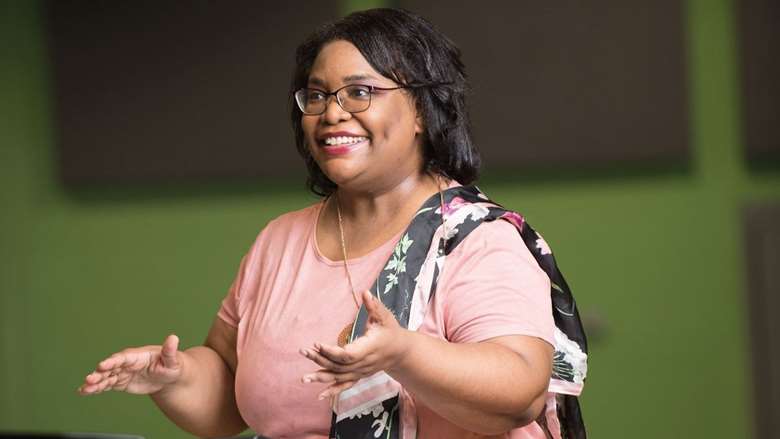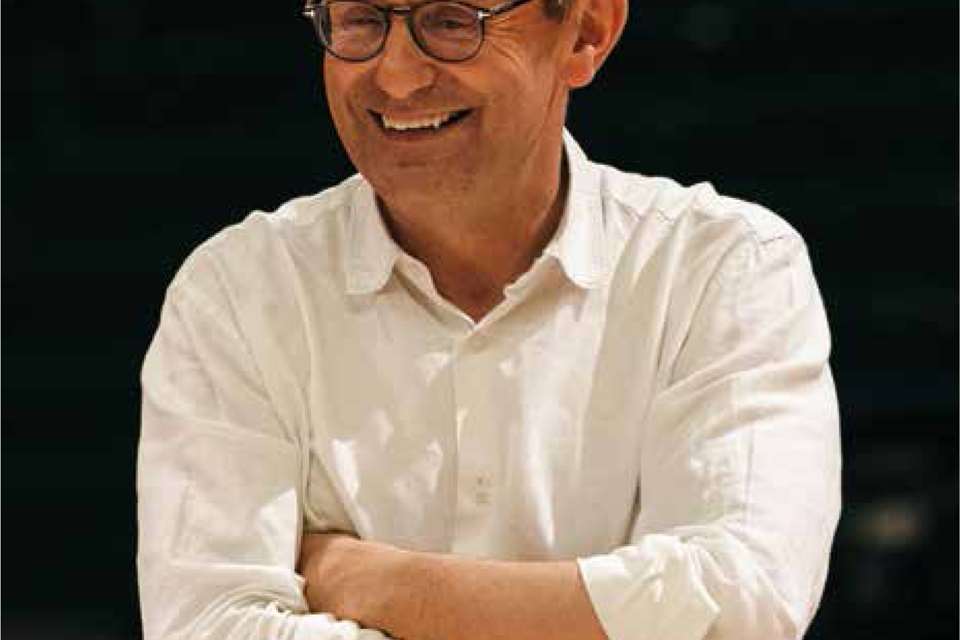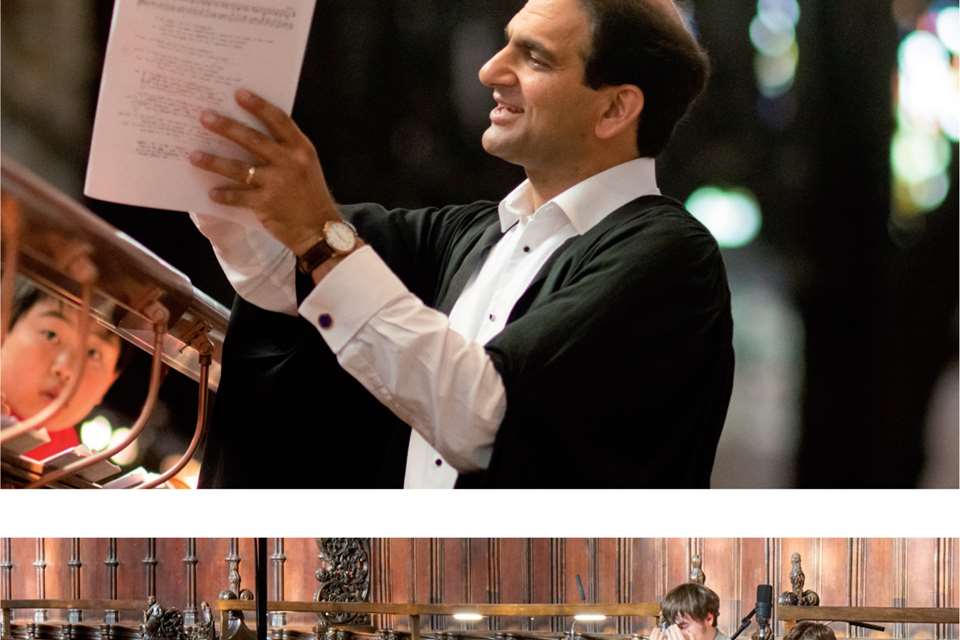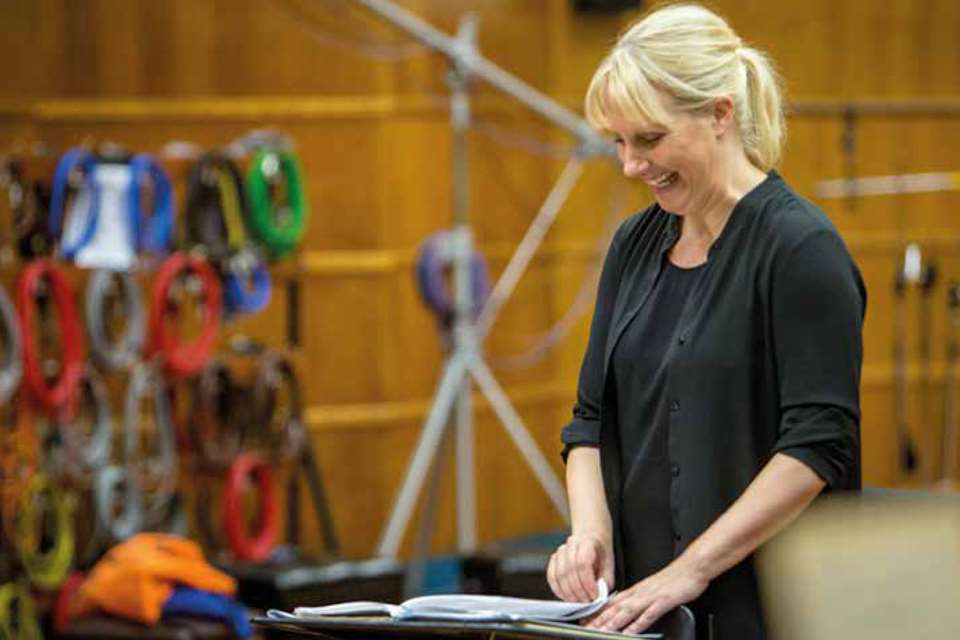David Hill in conversation with ... Dr Felicia Barber
Friday, February 23, 2024
David Hill meets the associate professor of choral conducting at Yale School of Music

DH: What is your musical background?
FB: I do come from a very musical family, but none with formal training. My mother was our church pianist, and my sister is currently the organist at my home church in Western New York. My sister has played since she was a teenager and plays brilliantly by ear. My maternal grandfather was a band leader in World War II, composed music and played guitar, clarinet, saxophone, and sang. He died before I was born, but I was told that he was a wonderful jazz musician. He taught my mother both saxophone and clarinet.
My fondest memories of music making are of hearing my mother and aunts sing together at church; I loved it.
DH: What were you doing from a young age?
FB: I fell in love with singing. It is funny that I find myself as a professional choral conductor: that was never really part of the plan. The love of singing continued, and I often was selected as a soloist for school events. I also participated in state and regional singing festivals.
I also played clarinet all throughout school and into college, but choir and singing has always been my first love. Unfortunately, my school choral programme was affected by budget cuts which lead to several choral directors, and no choral only instructor for my last two years of high school.
DH: Nothing changes it seems! When did you learn the piano?
FB: Unfortunately, I did not have the opportunity to begin until I went to college at 18. I’d wanted to learn since I was a child, but I experienced a situation which I shared in a recent presentation on bias and racism in the music classroom. When I was seven, my mum found a piano teacher and I was supposed to be sharing lessons with my friend Jenny Crane. We went there for our first lesson and at the end of it the piano teacher took me into the parlour, away from Jenny, and then she proceeded to tell me she couldn’t teach me. I didn’t know if I had done something wrong. She said, ‘I can’t teach you as your hands are too small’. But as soon as I left and reached for Jenny’s hand to walk down the street, I realised that it wasn’t about the size of my hand but rather the colour of my skin. Our hands were the same size. That’s one of my first memories in which I experienced direct racism. I never took another lesson until I got to college.
DH: That’s truly shocking. Where did you go to college?
FB: In Oklahoma: My undergraduate degree is from Oral Roberts University in vocal performance. I didn’t know what I should major in, I just knew I loved to sing. I didn’t have much direction from counsellors about what type of music to major in – no one really guided me. I had been accepted pre-law to Spellman College in Atlanta, GA. But after a visit to ORU and my acceptance to the music programme there (I auditioned without my mother knowing, with a hymn), I enrolled there instead. Whilst there, I had an affinity with music theory and found myself tutoring in theory almost immediately. In my junior year, some of the theory faculty had me working for them!
DH: It sounds like you knew more about all this than they did!
FB: Ha ha! I’m not sure about that, but I did really enjoy theory classes. After completing my bachelor’s degree, I enrolled in a Master of Choral Music Education at Mansfield University in PA. As a teaching assistant I taught courses in music theory and appreciation as well as assisting the choirs. My mentor was Dr. Peggy Dettwiler, who was pivotal in my choice to pursue a career in choral music. We are still very close.
DH: What was involved in the music theory process at university?
FB: In the US undergraduate collegiate curriculum, we have two years for music theory, and then additional courses in counterpoint, orchestration, and form and analysis. All these classes include ear-training, aural dictation, and analysis, which I loved. In my Masters I continued with theory chorus, and even wrote an analysis treatise on music theory of Schumann’s Frauenliebe und -leben which I went on to perform as well in a Master’s recital. I was able to explore voice performance, conducting, and my love of theory during my Masters as I tried to figure out next steps for my career.
DH: Too many interests are a good thing, Felicia!
FB: Maybe, I am pleased that my first degree was in vocal performance which has allowed me to incorporate vocal pedagogy into my instruction and rehearsal process.
DH: What next after Mansfield?
FB: After completing the degree, I began teaching at a high school near Nashville, TN. While there I started an Advanced Placement (AP) music theory course for the county, and also became a national AP theory grader. I also taught music appreciation, strings (briefly), and three choirs (an auditioned SATB & treble, and non-auditioned SATB ensembles). It was there that a light bulb finally went on, and I knew this is what I was supposed to do with my life.
DH: I think taking your time to decide is commendable. When did you decide on the next stage of a doctoral programme?
FB: I felt it was time for a new challenge. I hoped to pursue a degree in Tennessee, but I couldn’t find a doctoral programme that fitted. Three years earlier, I attended a conference with Dr. André Thomas of FSU and thought, ‘If I ever go back to school, I would like to work with him’. That led me to apply to Florida State, which not only had Dr. Thomas as the director of the programme, but also offered a dual emphasis in music education and conducting, which was a great fit for me. I was accepted and became the first Black female to go through that degree programme.
DH: Is André your main mentor in choral conducting?
FB: Yes, along with Dr. Judy Bowers also at Florida State and Dr. Peggy Dettwiler from my Masters degree. I really appreciate how committed Dr. Thomas is in mentoring his students even beyond their time with him at the university. He continues to encourage and mentor even beyond the degree, which is why he is so admired an appreciated by all of us.
DH: He was with us in Yale during Covid and was deeply impressive for the reasons explained. What after Florida State?
FB: Yale is only my third post. Before it I taught at Westfield State University in Massachusetts where I was director of choral activities and instructed undergraduates in basic and choral conducting as well as choral pedagogy. I also taught for five summers at Gordon College in the Boston area for their summer Masters programme, courses in conducting and pedagogy.
DH: You must know more than anyone that being Black, a female and entering the conducting world, how difficult it is to be recognised, how do you think things are shaping up currently?
FB: It can be difficult to break into the field, I’ve seen a collective shift in the US within the last decade. Many professional organisations have started to recognise the racism and bias that we have known and experienced our entire lives but were never actually talked about in that space. For example, I have been involved in the American Choral Directors’ Association (ACDA) my entire professional life: they established a national diversity committee in 2017. We met at the national convention and had realistic and meaningful discussions about a wide range of topics. It continues to be real progress.
When I started in the early 2000s, as a young teacher, I remember reaching out for mentorship in my first year or two and being completely rejected. When I got to Florida State, and saw myself represented, I cannot describe the profound impact of that experience (referencing André Thomas). I think we are heading in a good direction with more people of colour (BIPOC) successfully breaking into the field.
DH: We are colleagues at the Institute of Sacred Music in Yale: can you tell us something about your role?
FB: It’s been interesting after my first year in Yale how many people of colour (at Yale as well as across the country) have approached me, so appreciative of my presence and work at the university. The feedback I have received has made it clear that my appointment at Yale has made a meaningful impact on others in the field (especially in the BIPOC community).
My primary role in Yale is to teach conducting to secondary conductors, create new courses emphasising choral pedagogy, and conducting Yale Camerata. New to Yale is the part of my position that involves education initiatives. So, the new classes that emphasise choral pedagogy, including African American Choral Literature and an Advanced Choral Pedagogy. In addition, I have been developing professional development sessions for teachers in the New Haven public schools. During my first year, we had four major sessions together and more are being planned.
DH: A central pillar of your work in Yale is being Director of Yale Camerata: can you tell us about that?
FB: Yes! It’s called a town and gown chorus, and I love that it is multi-generational and, especially this year, how diverse it is. Currently our youngest singer is 17 and we also have members in their 70s. Yale undergraduates, graduates, and area high school students and their teachers are also involved. It’s been a delight to see all this emerge. We saw over 150 people audition this year, which has been wonderful. The choir is currently made up of around 75 singers and I am thrilled Camerata really represents our community in Yale.
DH: Such a positive story! Finally, are there composers or works you would find it difficult to live without?
FB: My first love or passion is Gospel music, because it’s what my mother played in the house – the only thing! I also adore jazz – Ella Fitzgerald, Sarah Vaughan, and Nina Simone are some of my favorite jazz musicians.
How can I not mention spirituals – having just written a book about them! In that genre, works by William Dawson, Jester Hairston, and Undine Moore. Other favorite African American composers include Nathaniel Dett, Florence Price, and Margaret Bonds. I love classical music as well, Mozart, Beethoven, but especially Chopin, Faure, and Debussy – I’m a bit of a romantic!
DH: Well, that is a great example of advocating the idea that all music is important, and we should all open our ears even more widely. Thanks for such an interesting conversation, Felicia.
David Hill is musical director of the Bach Choir and Leeds Philharmonic Society, principal conductor of Yale Schola Cantorum, and associate guest conductor of Bournemouth Symphony Orchestra
This article originally appeared in the Spring 2024 issue of Choir & Organ magazine. Never miss an issue – subscribe today









